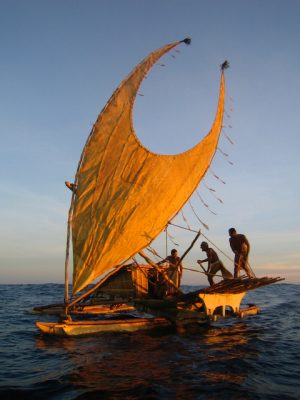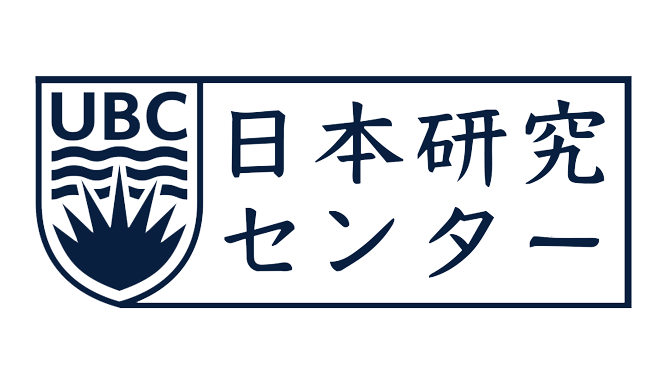
A vaka built in Taumako ©Vaka Taumako Project
February 2, 2023
5:00 to 7:00 pm
Reception: 7:00 to 8:30 pm
xʷθəθiqətəm or The Place of Many Trees
Liu Institute for Global Issues
6476 NW Marine Dr, Vancouver, BC V6T 1Z2
The future of the ocean is essential to the planet’s future and human life. Climate change intersects profoundly with biodiversity, food security for billions of humans, culture, and economy and peace. The sea-voyaging people of the Pacific have developed intimate and profound knowledge of the Ocean over millennia. The extreme biodiversity of the western Pacific makes its health key to revival of planetary biodiversity.
This is an opportunity to learn ways of knowing from Pacific knowledge keepers, to deeply enrich the understanding of the complex inter-relationships of ocean phenomena and what must be done to protect and live with the ocean for our own future survival. The session would bring together different forms of knowledge, including ocean science, geoscience, plant science and zoology, along with cultural history and narratives, music, anthropology, archeology, navigation, and others.
Opening Remarks
Dr. Mimi Kaveia George, Vaka Taumako Project of Pacific Traditions Society, Anahola, United States
Dr. Rashid Sumaila, University Killam Professor, UBC Institute for the Oceans and Fisheries & School of Public Policy and Global Affairs
Dr. Yves Tiberghien, UBC Konwakai Chair in Japanese Research, School of Public Policy and Global Affairs/Institute of Asian Research, & Professor, Department of Political Science
Co-Moderators
Dr. Andrea Reid
Centre for Indigenous Fisheries, UBC Institute for the Oceans and Fisheries
Dr. Rashid Sumaila
University Killam Professor, UBC Institute for the Oceans and Fisheries & School of Public Policy and Global Affairs
Speakers
Benito is a member of the Houpolowat clan, and its canoehouse, Utt Wenimai. He also belongs to Utt Wenipukuw. Benito was educated in the Weriyeng school of navigation and as a child, studied under some of the most famous and revered old-time navigators from Polowat, including Hipour and Manipy Onopey. As an adult Benito studied with the late Teo Onopey and Rainam Edward.
A long time cameraman, photographer, and archivist of Polowat images based in Saipan, Benito was the lead photographer for the documentary “Sacred Vessels: Navigating Tradition and Identity in Micronesia” (1997) and shot for many visiting documentary teams over the past two decades.
Benito serves as an informal ambassador of Polowat seafarers in Saipan, served as one of the coordinators and translators in the building of the Lien Polowat in 2012 and its sail to Guam and itʻs final resting place at the Oceanic Culture Museum in Okinawa in 2013.
In 2016, the pwo ceremony, which names navigators as masters, took place at Paseo in Guam, where navigators were staying for the Festival of Pacific Arts. Benito was one of five ordained by Grandmaster Navigator Rainam Edward of Polowat.
"Lolobeyong” means “the lucky one” and his name is derived after a particular chant that his father would use before entering into any gathering. The chant was meant to imbue love and peace among the members, so that even those in the group, that though they did not know who he was yet, the chant would open their hearts and mind. Born and raised on Saipan in the Northern Mariana Islands.
Lolobeyong, aka “Lolo”, is the only son of Master Navigator Mario Benito and his mother Rose Benito. Together with his parents, he had been raised to love both the ocean and the land and to explore the bounties of what both life on the ocean and on land can bring. Lolo enjoys farming, just as much as he enjoys being out on the ocean. Given the impact of climate change and the need to learn how to survive, he understands the value of farming and the joy that locally sourced food brings to the table.
Throughout his childhood, Lolo has watched his father teach and discuss traditional navigation as well as carve paddles and canoes. When he turned fifteen, he learned how to sail, how to tie the lashings on a canoe, and how to use the natural elements to his advantage. Lolo has a love for adventure and a thirst for traditional knowledge and his goal is to ensure that his ancestors’ and his father’s legacy is shared with the rest of Micronesia, to remind others of where they come from, and that these shared collectives of sailing and maritime traditions will unite all Pacific Island peoples together."
Delsie Betty Bosi is a teacher by profession. During the course of her teaching career, her interest circled arounds ways of preserving and conserving marine and land resources due to the rapid depletion done by logging and over harvesting of marine resources as a result of poor management or poor decision making by leaders in the community.
She left her teaching career to work with women and youth in the community. These are the people who are more responsible to building a society of people who care for the land and the sea. These are the people who are voiceless, yet when they know what they want, they stand up to rise against the odds to be builders of their communities, therefore, protect and care for the sea and its resources.
Hence in Taumako, like any other community, women are passive decision makers. Yet their role in the use of the sea and its marine resources is paramount to their survival. Women are the gatherers. They fish like the men for their survival. They gather shells and other marine resources on the reef for food. Yet, little did they know that these marine resources do not reproduce at the same rate that they are being harvested.
Mangroves are being cut down for firewood or for building materials. And so the many areas for fish to shelter and reproduce is being already disturbed by these human naivety on the small island of Taumako.
There then lies the interest of women and youth involvement in protecting the sea and their marine resources for the future and practice sustainable harvesting of resources. Conservation and preservation of the marine environment is then of prime importance in the islands of Taumako.
Marianne “Mimi” George, Ph.D, is a cultural anthropologist and sailor who supports training youth to apply ancestral voyaging knowledge to current problems, including unemployment, biodiversity loss and climate change. Mimi responded to requests to help document voyaging traditions of Austronesian people of New Ireland Province, Papua New Guinea; a small, a mixed-gender crew wintering a sailboat in Antarctic sea-ice: networks of sea-hunters and reindeer herders across Bering Straits, and Polynesian people of Taumako, SE Solomon Islands Mimi describes roles of women and children in voyaging cultures, and how ancient navigation methods are holistic expressions of ancient knowledge systems.
Mr. Sanakoli John is co-founder of Pasana Group, Papua New Guinea's first traditional canoe building school. Sanakoli was born into the Dove clan of Basilaki Island in Milne Bay, Papua New Guinea. Like most children on Basilaki, he would travel with his family in traditional sailing canoes, known locally as Sailau, as soon as he could walk. On Basilaki the Sailau is used for fishing, transport, and the traditional Kula trade system that connects the outer islands of Milne Bay. Sanakoli is one of the most well-known sailors in the region; in 2015, he won the national Kenu and Kundu canoe race. In 2017, Sanakoli and two other crew completed the first ever recorded circumnavigation of the island of New Guinea in a traditional sailing canoe - a voyage that spanned 6,300kms, 13 months and inspired the nation. In 2019, Sanakoli co-founded Pasana Group to teach traditional canoe building skills and sustainable livelihood practices to the youth of Milne Bay. By collaborating with other Pacific voyaging groups, Sanakoli hopes that sailing canoes can reconnect the people of the Pacific so that they can sail the ancient routes and teach young people and advise others interested in learning how to live sustainably and conserve the ocean, animals, plants, and weather.
I am young and energetic with an enquiring mind and am consistently opting to seek avenues to excel my capacity for the common good of humanity I serve and environment which I remain a part of. I am passionate to learn new knowledge and skills from others across the globe to enhance my capabilities. I personally believe in hard work, dedication, commitment, humble and focus oriented, team work and collective knowledge sharing are pillars of uniting all races for one common good, and that is to PROTECT AND SAVE THE ENVIRONMENT AND HUMANITY.
I have realised my dream to captain a Drua (traditional sailing vessel of Fiji), and I hope that in 10 years I will see 100 Drua sailing throughout Fiji. As a child I lived with my grand parents on Fulaga Island in the Lau Group of Fiji. They took me sailing between islands on traditional Camakau vessels. We fished and gathered seafoods, and we partnered with people of other islands. This made our island lifeways sustainable. We monitored and cared for the ocean, in all itʻs diverse creatures, plants, winds, rains, stars, and seasons. In 2010 I graduated from Fiji Institute ofTechnology, and began studying both modern and traditions of maritime navigation. In 2010 I was certificated in NZCG Day Skipper and Boat Master. In 2016 I graduated from Maritime School with a Master in Engineering, and I became Captain of the Sailing Vessel Moana (Denarau). In 2018 I because Captain of the sailing catamaran Uto Ni Yalo. From 2018 to present I am Captain of the Drua, I Vola Sigavou. My father was just in Berlin rigging a Drua at the Humboldt Forum museum. I strive to see 100 Drua serving remote Fijian communities, and networking throughout the Pacific.
Luke Vaikawi grew up learning ancient stories, skills, methods, and ecological knowledge from experts of ancestral voyaging knowledge. Vaikawi was the oldest of the first four born and raised Taumakans to obtain post-secondary school education. Vaikawi assisted his grandfather, Paramount Chief Koloso Kaveia, in establishing the Vaka Taumako Project, to train a new generation to build voyaging vessels and navigate using only ancestral designs, materials, methods and tools. From 1993 to 2017 Vaikawi assisted Kaveia and Mimi George, in carrying out the project under research permits from the Ministry of Educaton and Human Resources. Vaikawi stood firm in meeting administrative and budgetary challenges through decades of "tension" (civil disorder), chronic lack of resources, governmental incapacity, and, most recently, COVID closures. For 25 years Vaikawi also commanded Solomon Islands Maritime Police and initiated international marine resource monitoring and safety programs of Solomon Islands. Vaikawi used ancestral leadership and navigation methods and concepts he learned from Kaveia when at sea.
Vaikawi retired in 2018 and attended to founding the Holau Vaka Taumako Project (HVTA). He was elected as Executive Director by the Taumako community membership. A top priority of the HVTA are educating next generations in ancestral voyaging knowledge and cultural practices that enable them to mitigate and adapt to effects of climate change. These include: 1) continued resistance to environmentally destructive resource extractions such as logging, mining, and overfishing, and 2) re-implementation of traditional practices and technologies that avoid use of environmentally toxic products such as petro-chemical fuels, plastics, and processed foods. The HVTA methods to achieve these goals include 1) supporting matrilineal rights and privileges of girls and women to protect island, reef, and inter-island resources and relationships, and re-building traditional structures (Holau) where boys were mentored by mature men, and 2) use of local natural materials for everyday needs, such as building and using sustainable sea transport vessels with sails, rehabilitating reefs and lagoons by replacing stones that were removed to build seawalls so that the stones modulate destructive wave actions and provide hiding places for fish fry to grow, and using leaves for plates and the walling of houses, 3) re-opening ancestral sea-routes between islands and across borders, to create protection for critical local and regional stocks of biodiverse plants and animals, and 4) reactivate use of traditional valuables instead of modern currencies to benefit regional and interregional networks that provide resiliency to all.
Heu’ionalani “Meph” Wyeth served as Permanent Secretary of the Vaka Taumako Project of Pacific Traditions Society since 1996 (www.vaka.org ). She instructed the first groups of Taumako video students, most of whom had never seen a camera before. Wyeth writes articles, gives presentations, and protects archival materials until there is adequate accommodation at Taumako.
Wyeth is a Director of Ka’imi Na’auao o Hawai’i Nei Institute (www.kaimi.org) which preserves and teaches Hawaiian culture. In this role and in the Vaka Taumako Project Wyeth is much concerned with the Story of Lata, who is regarded as the Goddess of Hula and as the first voyager. Wyeth is a lifelong student of Classics, and one of a large family of sailors.
 |
 |
 |

|
RSVP
This event is now SOLD OUT! Also, waiting list is full.
Sponsored by:
 |

|
 |
 |

|
|
 |